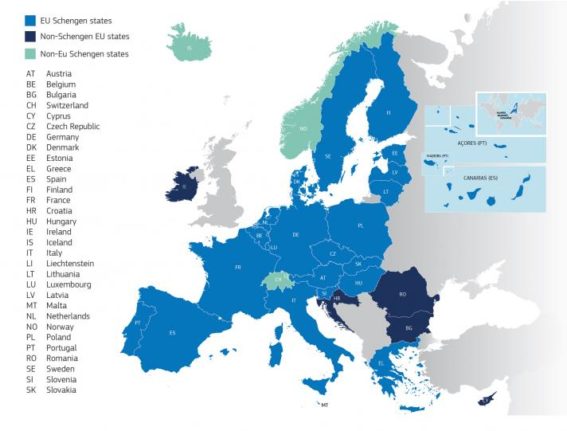UK news outlet i News on Tuesday published an interview-based article in which Spanish Tourism Secretary Fernando Valdés said his government wants British visitors not to be subject to the Schengen 90-day rule post-Brexit.
“It is in Spain’s interest to get rid of the rule” and “lobby to convince [the EU] we can try to work an exception with them,” he is quoted as saying.
Brexit news outlets the Daily Express and GB News have jumped on the story with headlines such as “Desperate Spain begs EU…”, which evidences how the ‘they need us more than them’ rhetoric is still alive for some.
The proposal of Britons not being subject to the 90-day rule is in fact not new.
Last year, The Local Spain reported how Valencian authorities were calling for UK nationals to not have their time on Spain’s Costa Blanca limited or determined by the Schengen rules that now apply to them.
Valencian regional president Ximo Puig said at the time that he wanted “Brexit to be as Brexit-less as possible” and asked Spain’s Tourism Minister Reyes Maroto to “facilitate the visa situation” and “correct the restrictions” Brits now face.
Valdés’s words suggest the proposal has indeed reached the ministry, but as the Tourism Secretary pointed out about the 90-day rule, “unfortunately, this is not something Spain has established by itself”.
Since the start of 2021, Britons who are not in possession of a residency document from Spain or another EU/Schengen country can only stay 90 days in any 180-day period within the Schengen Area, including in Spain.
The end to freedom of movement for non-resident Britons has continued to be a big concern for those who before Brexit could spend extended periods in their favourite spots in Spain and Europe.
Hundreds of thousands of UK nationals enjoyed up to six months a year in Spain (sometimes all in one go) in properties they owned or rented out, but now they must plan their time carefully to not fall foul of the law.
“It is true that after Brexit some problems have emerged with people wanting to stay longer,” Valdés acknowledged.
READ MORE: How Brits can properly plan their 90 out of 180 days in Spain and Schengen Area
It’s also a worry for authorities in Spanish towns such as Benidorm that cater for these long-term British visitors, as they play a vital role in many local economies, and since Brexit and the pandemic UK visitor numbers have fallen.
So can this actually happen? Can Spain or a region of Spain reach a deal with UK authorities which allows Britons to spend up to six months in Spain in one go or in a year?
Can Spain be a member of the Schengen Area but have its own bilateral agreements with third countries?

First, some background
Spain joined the EU in 1986 and the Schengen Area in 1992. The UK joined the European Communities (precursor to the EU) in 1973 and never formed part of the Schengen Zone.
Before joining the free movement scheme, Spain signed a number of bilateral agreements with third countries in the 1960s or earlier.
According to the official journal of the European Union, this allows countries that had these deals in place before joining Schengen to “extend beyond three months an alien’s stay in its territory in exceptional circumstances or in accordance with a bilateral agreement concluded before the entry into force of this Convention”.
Before joining Schengen, Spain had bilateral agreements with most Latin American nations, Canada, the US, Israel, Japan, Singapore, South Korea and New Zealand among others, but not the United Kingdom.
Prior to Schengen membership, Spain did not waive the visa for any of these non-EU countries for a period longer than three months.
Ninety days was the limit of pretty much all bilateral agreements between European nations and third countries, with the exception of those with diplomatic passports in some cases.
So to recap, Spain didn’t have a bilateral agreement with the UK prior to joining Schengen, and if it had, it wouldn’t necessarily mean Brits could easily extend their stay in Spain past 90 days.
Is it possible for Brits in Spain to get an extension past 90 days?
There is no evidence that Spain currently gives preferential treatment to the 19 non-EU countries which it did sign bilateral agreements with before joining Schengen.
Third country nationals who don’t currently need a Schengen visa to enter Spain – including Britons – are pretty much the same across all Schengen countries.
In essence, Spain is sticking to the framework of free movement and a common visa policy between the Schengen members, not playing by its own rules.
As Spain’s Tourism Secretary pointed out regarding changing the rules “we cannot do so unilaterally” and “the solution must come from them”, meaning the EU.
Is an extension of the 90-day rule possible on a case-by-case basis? Yes, it’s called a prórroga deestancia de corta duración sin visado (extension of short stay without visa).
But Spanish law states the same as EU law – it has to be due to “exceptional circumstances”, and no mention is made of pre-existing bilateral agreements.
Exceptional circumstances include situations involving humanitarian causes, gender violence, human trafficking and other grave matters. So it’s not a solution for British tourists and second-home owners.
It’s notoriously difficult to have this extension approved and the applicant has to show proof of financial means and health care as well as offer guarantees they will leave Spain, among other documentation, in order for a short extension to be allowed.

Could the visa waiver for Britons in Spain be changed from 90 to 180 days?
The UK currently offers Spanish nationals six months of continuous visa-free travel in the United Kingdom, so for many non-resident Britons a reciprocal deal with Spain would be ideal, even if it applied to just Spain and not the whole Schengen Area.
British authorities offer the same to other EU/EEA and Swiss nationals post-Brexit, but for UK nationals the 90 out of 180 days rule applies, even if it does add up to six months within a year.
The EU is currently preparing to launch its ETIAS (European Travel Information and Authorisation System) system in 2023, along with the introduction of the new Entry and Exit System (EES) will also see passports scanned and leave less room for error.
But there has been no mention of this overhaul resulting in more lenient conditions to the 90-day rule.
The legality of Spain signing its own deal with the UK whilst forming part of the EU and Schengen Zone remains a grey area as there’s no recent precedent to this.
On the one hand the EC states that “Member States may make specific arrangements in bilateral agreements. General exceptions provided for by national law and bilateral agreements shall be notified to the Commission”.
But on the other hand, “common measures on the crossing of internal borders by persons and border control at external borders should reflect the Schengen acquis incorporated in the Union framework”.
As Spain’s Tourism Secretary readily admitted, it’s not entirely up to Spain to decide.




 Please whitelist us to continue reading.
Please whitelist us to continue reading.
Covid, having masked some of the Brexit fallout regarding the 180 – 90 day rule will, it seems affect a lot of local Spanish businesses. Having spoke to a few restaurant owners and a manager of a golf course all in the Estepona area reported they will have to substantially scale back “normal” plans due to the lack of Brits coming out for the whole of the winter and spending their money in all the local economies. I was in the Estepona area for 5 weeks in September/October and it did see seem many local workers were spooked by a severe lack of regular and normally expected booking not happening due to Brits not arriving for the winter. Indeed, after talking to property owners like myself I was shocked to hear how many would be selling there homes and buying in areas like northern Cypress where such restrictions do not apply. It would be a shame to see this happen as businesses that have built up over the years are liable to close. If somehow the ruling could be changed to 180- 360 it would probably save the day. We will have to wait and see.
Simon.